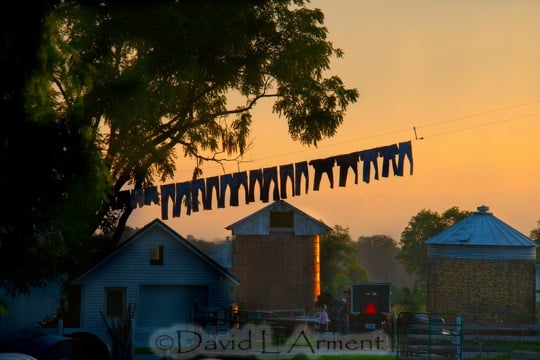Three Hundred And Ten Descendants
This obituary tells of an Amishman named Jonas A. Nisley who passed away late last month in Ohio. Jonas had 310 living descendants. If you add his step-descendants, you get an additional 70 individuals, for a total of 380 souls. Here’s the tally of his family, in addition to his twelve children:
96 grandchildren; 11 step-grandchildren; 201 great-grandchildren; 57 step-great-grandchildren; one great-great-grandchild; and two step-great-great-grandchildren.
At some point the patriarch also suffered the loss of a grandchild, and two great-grandchildren. Once you reach your 90s, and you’ve had a sizeable Amish family, odds are decent that your living descendants number in the hundreds. Jonas had a family larger than the Amish average at 12 children. And by those numbers it’s not unlikely that an older Amish person might have experienced the death of a loved one decades younger. In this man’s case, it happened three times over.

Photo by David Arment
Though there is always the risk of that loss, there are also many blessings that come with such large families. It’s nothing new at this point, but I still marvel at the size of Amish families, especially when I come across an example like Jonas (here’s another example). It’s one of the areas where the Amish come into most stark contrast with “English America”, where three children is now considered a sizeable family. Though no family in any culture is perfect, Amish follow the Biblical instruction to “be ye fruitful and multiply”, and are rewarded for it here on Earth, and they would hope in the afterlife as well.
Condolences to Jonas’ family.




That is an interesting Amish surname. I’ve never seen that one before.
It’s not too common as you might surmise. I believe I first saw it among Amish in northern Indiana.
Here’s an excerpt from GAMEO: https://gameo.org/index.php?title=Nissley_(Nisley,_Nissli,_N%C3%BCssli)_family
The progenitor of the family was named Jakob Nissley. He was from the Swiss Emmental, and he died in Lancaster County in 1752. The spelling of his family name seems to have been uncertain. According to tradition it may have been Nutt or Nolt; but more likely it was Nuss or Nüssli. In any case, his descendants are almost uniformly known by the name Nissley. Among them may be mentioned three bishops in the Lancaster Conference: Samuel Nissley (1761-1838), who was ordained as preacher in 1790 in the district west and north of Lancaster, and as bishop before 1800; Christian Nissley (1777-1831), who became a preacher in the Mount Joy area in 1812, and bishop in 1820; and Peter R. Nissley (1864-1921), who was ordained as a preacher in the Kraybill congregation in 1904, and bishop in 1911.
Another large family with interesting g surname
My grandfather had an even more rare Amish surname with 320 direct descendents when he passed. Grandpa was a rare soul among Amish and all his grandchildren loved him – he maintained a relationship with all his descendents regardless if they chose the Amish life or left it for another faith.
https://www.legacy.com/obituaries/kpcnews/obituary.aspx?n=levi-jones&pid=186111285&fhid=8861
Jones
Wow – a Jones Amishman. For me it’s one of the most interesting of “Amish” names for how un-Amish it seems. Another in that category is Lee. I am certain I visited some of his children/relatives when selling books in the northern Indiana community in 2006. Thanks for sharing that.
Born in 1927. Babe Ruth was playing baseball when this guy was born. Good for him making it to 93.
He spent time as a farmer and plant nursery manager. Wonder if that helped play a role in his longevity.
I bet it didn’t hurt. In addition to the fresh air and physical exercise that lifestyle brings, I think tending plants is an activity which decreases stress. At least it does for me on the very small scale (houseplants) that I do it.